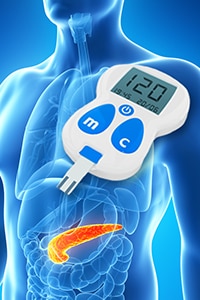Diabetes

Diabetes affects an estimated 38.4 million people in the United States and is the eighth leading cause of death. Additionally, an estimated 97.6 million U.S. adults have prediabetes, which means their blood glucose levels are higher than normal but not high enough to be diagnosed as diabetes. The most common forms of diabetes are type 1 diabetes, type 2 diabetes, and gestational diabetes.
Diabetes is characterized by the body’s inability to produce and/or respond appropriately to insulin. These defects result in persistent elevation of blood glucose levels and other metabolic abnormalities, which in turn lead to the development of disease complications, such as heart disease and stroke, blindness, kidney failure, and lower limb amputation. In addition to increasing the risk for these complications, diabetes also doubles the risk for many forms of cancer, some forms of dementia, hearing loss, erectile dysfunction, urinary incontinence, and many other common diseases.
NIDDK supports basic, clinical, and translational research to combat diabetes and its associated complications. For example, NIDDK-supported researchers are:
- studying genetic and environmental factors that contribute to the development and progression of diabetes;
- identifying ways to reduce diabetes health disparities
- studying ways to preserve insulin-producing cells of the pancreas;
- identifying new methods to improve blood glucose monitoring and insulin delivery in type 1 diabetes;
- examining behavioral approaches to prevent type 2 diabetes and to enhance diabetes self-management;
- conducting clinical trials testing new prevention and treatment strategies for diabetes and its complications; and
- uncovering the fundamental cellular and molecular pathways underlying development of diabetes and its complications to develop new and more personalized approaches to prevention and management.
NIDDK also administers the Special Statutory Funding Program for Type 1 Diabetes Research (or Special Diabetes Program), which is a special appropriation dedicated to supporting research on type 1 diabetes and its complications. More information on the Program and the research it supports is available on the Type 1 Diabetes Research Special Statutory Funding Program website.
In addition, NIDDK has congressional authorization for the National Diabetes Information Clearinghouse, which provides services via the NIDDK Health Information Center. NIDDK provides health information about diabetes to people with diabetes and to their families, health professionals, and the public.
Research Updates and News
- NIH launches large study to tackle type 2 diabetes in young people
- Use of metformin in adults with diabetes linked to lower risk of long COVID
- Bariatric surgery provides long-term blood glucose control, type 2 diabetes remission
- Celebrating the 50th Anniversary of Diabetes Research Centers
- Diabetes in America now available
Select Landmark Studies
What We Do
To achieve its mission, NIDDK supports, conducts, coordinates, and plans research. NIDDK also provides data and samples from NIDDK-funded studies and explains research findings to health professionals and the public.
Support Research
NIDDK invests in basic, clinical and translational research and training at colleges, universities and other institutions.
- Bioengineering, Biotechnology, and Imaging as applied to Diabetes, Metabolic, and Endocrine Diseases
- Clinical Research in Type 1 Diabetes
- Clinical Research in Type 2 Diabetes
- Diabetes and Metabolism HIV/AIDS
- Diabetes Genetics and Genomics
- Diabetes, Endocrine, and Metabolic Disease Translational Research
- Diabetes: Treatment, Prevention, and Complications
Conduct Research
NIDDK investigators conduct biomedical research and training in the Institute's laboratories and clinical facilities in Maryland and Arizona.
- Diabetes, Endocrinology, and Obesity Branch
- Laboratory of Biochemistry and Genetics
- Laboratory of Biological Modeling
- Laboratory of Bioorganic Chemistry
- Laboratory of Cell and Molecular Biology
Coordinate & Plan Research
NIDDK takes multiple approaches to research planning and priority setting.
Meetings & Workshops
View all Meetings & WorkshopsStrategic Plans & Reports
- Diabetes in America
- Heterogeneity of Diabetes
- NIDDK Strategic Plan for Research
- Diabetes in America, 3rd Edition
- Special Statutory Funding Program for Type 1 Diabetes Research: Progress Report
Provide Access to Research Resources
NIDDK makes publicly supported resources, data sets, and studies available to researchers.
View all Research ResourcesProvide Health Information
NIDDK provides patient education information, practice tools for diagnosis and treatment, and statistics.
